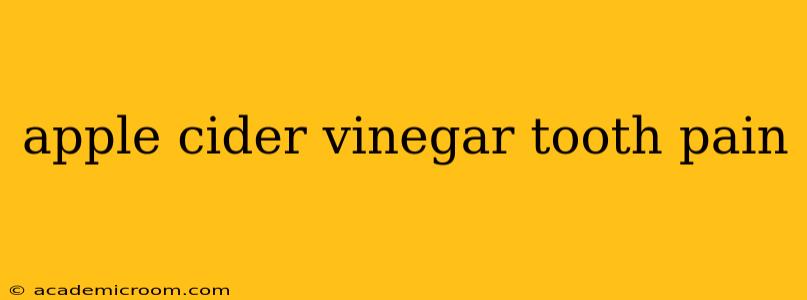Tooth pain is a common ailment, often striking unexpectedly and causing significant discomfort. While a dentist visit is crucial for proper diagnosis and treatment, many seek home remedies for temporary relief. Apple cider vinegar (ACV) has gained popularity as a potential remedy, but does it truly alleviate toothaches? Let's explore the facts and debunk the myths surrounding ACV and tooth pain.
Does Apple Cider Vinegar Help with Tooth Pain?
The short answer is: maybe, but with significant caveats. ACV's purported benefits stem from its acidity, which can temporarily neutralize bacteria and reduce inflammation. Some believe its acidic nature can help dissolve food particles lodged between teeth, contributing to pain relief. However, this is not a recommended treatment, and relying solely on ACV can be detrimental to your oral health.
How Does Apple Cider Vinegar Work (Theoretically)?
The acidity of ACV, primarily due to acetic acid, is thought to potentially:
- Kill bacteria: Some bacteria contributing to tooth decay and gum infections are sensitive to acidic environments. However, the acidity of ACV is also damaging to tooth enamel.
- Reduce inflammation: Mild inflammation can contribute to tooth sensitivity and pain. The antimicrobial properties of ACV might offer temporary relief by reducing inflammation, but this is not clinically proven.
- Dissolve food particles: The acidity can help break down some food particles stuck between teeth, potentially relieving pressure and pain. Again, this effect is minimal and shouldn't replace proper brushing and flossing.
Can Apple Cider Vinegar Damage Teeth?
Yes, the high acidity of apple cider vinegar can significantly damage your tooth enamel. Enamel erosion leads to increased tooth sensitivity, cavities, and other dental problems. The long-term effects of using ACV to treat tooth pain far outweigh any potential short-term benefits. Frequent use can weaken your teeth, making them more vulnerable to decay and requiring costly dental intervention.
What are the Side Effects of Using Apple Cider Vinegar for Tooth Pain?
The most significant side effect is enamel erosion. Other potential side effects include:
- Tooth sensitivity: Increased sensitivity to hot, cold, and sweet foods and drinks.
- Gum irritation: The acidity can irritate the gums, leading to inflammation and discomfort.
- Burning sensation: Direct contact with ACV can cause a burning sensation in the mouth.
Is Apple Cider Vinegar a Safe Alternative to Professional Dental Care?
Absolutely not. Apple cider vinegar is not a replacement for professional dental care. While it may offer temporary, minimal relief for mild discomfort, it should never be used as a primary treatment for tooth pain. Ignoring persistent tooth pain and relying on home remedies can lead to serious dental problems requiring extensive and costly treatment.
What Should I Do If I Have a Toothache?
See a dentist as soon as possible. They can accurately diagnose the cause of your tooth pain and recommend the appropriate treatment, which might include:
- Filling a cavity
- Root canal
- Extraction
- Treatment for gum disease
Delaying professional care can worsen the problem and increase the cost and complexity of treatment.
What are Some Safe Home Remedies for Toothache Pain Relief?
While ACV is not recommended, some safe home remedies for temporary pain relief include:
- Rinsing with salt water: This can help clean the area and reduce inflammation.
- Applying a cold compress: This can numb the area and reduce swelling.
- Over-the-counter pain relievers: Ibuprofen or acetaminophen can help manage pain.
Disclaimer: This information is for educational purposes only and does not constitute medical advice. Always consult a dentist for any dental problems.
